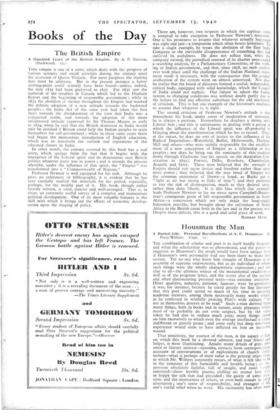Books of the Day
The British Empire
A Hundred Years of the British Empire. By A. P. Newton. (Duckworth. i5s.)
Tins volume is one of a series which deals with the progress of various sciences and social activities during the century since the accession of Queen Victoria. For most purposes the starting date must be arbitrary. But in the present instance a better starting-point could scarcely have been found—unless, indeed, the date 1832 had been preferred to 1837. For 1837 saw the outbreak of the troubles in Canada which led to the Durham Report and the beginning of responsible government ; while in 1833 the abolition of slavery throughout the Empire had marked the definite adoption of a new attitude towards the backward
4* peoples ; the India Act of the same year had taken the first steps towards the abandonment of the view that India was a conquered realm, and towards the adoption of the more enlightened attitude expressed by Sir Thomas Munro as early as 1824, when he said that the British dominion in India would only be justified if Britain could help the Indian peoples to train themselves for self-government ; while in these same years there had begun the momentous introduction of English education, which was to transform the outlook and aspirations of the educated classes in India.
In other words, the century covered by this book has a real unity, which springs from the fact that it begins with the emergence of the Liberal spirit and its domination over British politics whatever party was in power ; and it records the process whereby, under the influence of that spirit, the " Empire " was transformed into a " Commonwealth of Nations."
Professor Newton is well equipped for his task. Although he gives no references or bibliography, it is evident that he has very carefully studied the materials for his period, especially, perhaps, for the middle part of it. His book, though rather heavily written, is solid, concise and well-arranged. This is, in short, an extremely useful survey of a complex and momentous political development. One of its most valuable features is the skill with which it brings out the effects- of economic develop- ments upon the shaping of policy. There are, however, two respects in which the captious critic is tempted to take exception to Professor Newton's treatment. One is his proneness to assume that whatever actually happened was right and just—a temptation which often besets historians. To take a single example, he treats the abolition of the East India Company as the inevitable disappearance of something that had outlived its usefulness. He does not reflect that, while the company existed, the periodical renewal of its charter necessitated a searching analysis; by a Parliamentary Committee, of the work- ing of Indian government, and that, since 1858, no such analysis ever took place until the challenge of the Indian National move- ment made it necessary, with the consequence that the gradual ossification of the system went on almost unnoticed. Nor does he realise that the board of directors formed a useful, independent, critical body, equipped with solid knowledge, which the Council of India could not replace. Our failure to adjust the Indian system to changing conditions was without doubt partly due to the failure to find any effective substitute for the old machinery of criticism. This is but one example of the historian's readiness to assume that whatever is, is right.
The second criticism of Professor Newton's attitude is that throughout his book, under cover of moderation of statement. he is always a partisan. Everywhere he displays a strong anti- Liberal bias ; and this is unfortunate in dealing with a period in which the influence of the Liberal spirit was all-powerful in bringing about the transformation which he has to record. Thus, at the outset, he does no sort of justice to the influence of the Radical Imperialists—Waterfield, Buller, Molesworth, Durham, Mill and others—who were mainly responsible for the establish- ment of a new conception of Empire as a fellowship of free peoples ; nor does he bring out the continuity of this tradition down through Gladstone (see his speech on the Australian Con- stitution in 1855), Forster, Dilke, Rosebery, Chamberlain, Asquith and Grey. These men believed that the strength of Empire should rest upon justice and freedom rather than upon mere power ; they believed that the true bond of Empire was the common enjoyment of liberty—a bond, as Burke put it, " light as air but strong as links of iron "; and they preferred to run the risk of disintegration, much as they desired unity, rather than deny liberty. It is this bias which (for example) leads Professor Newton to lay no stress upon Campbell-Banner- man's courageous grant of full responsible government in South Africa—a concession which not only made the long-sought federation possible, but brought about the enlistment of South Africa in the British cause both in the last and in the present war. Despite these defects, this is a good and solid piece of work.
RAMSAY MUIR.


























 Previous page
Previous page